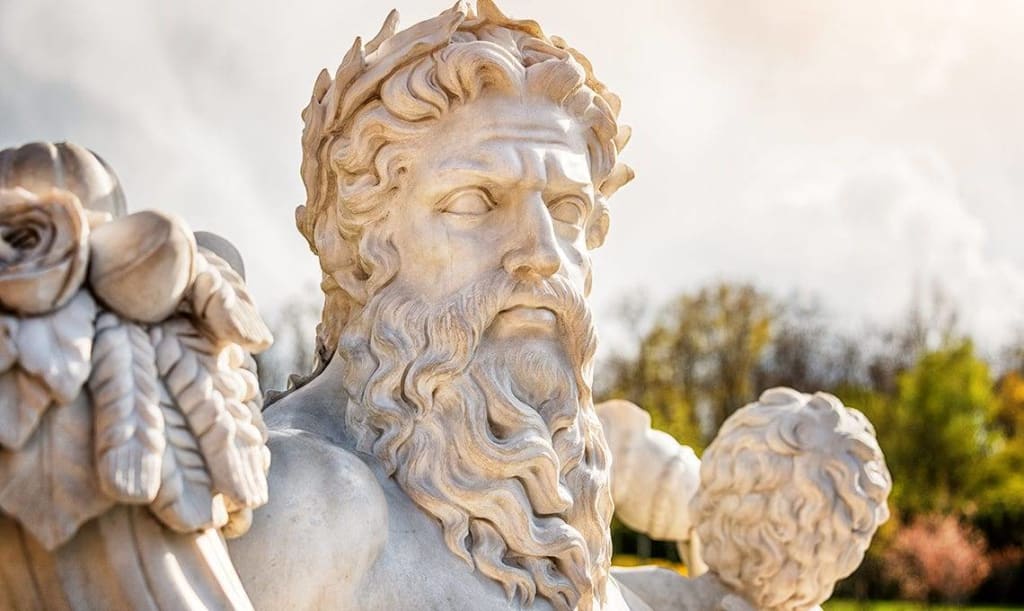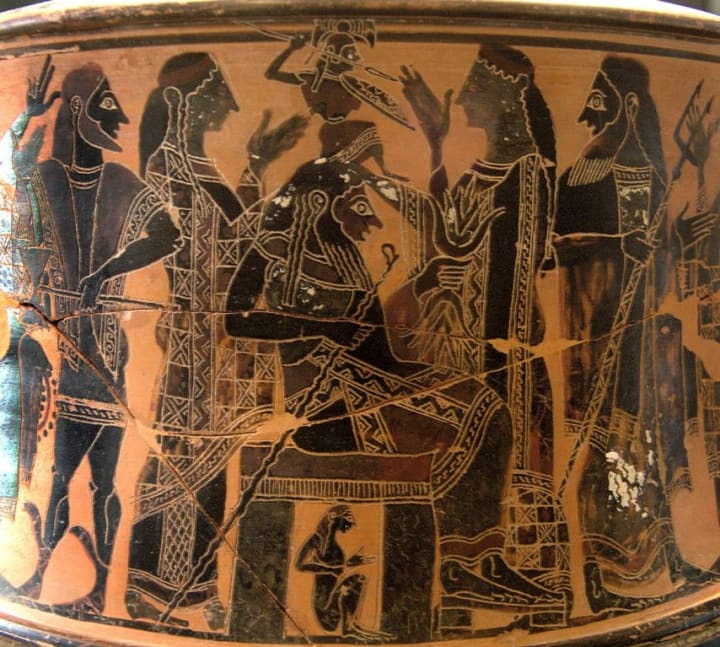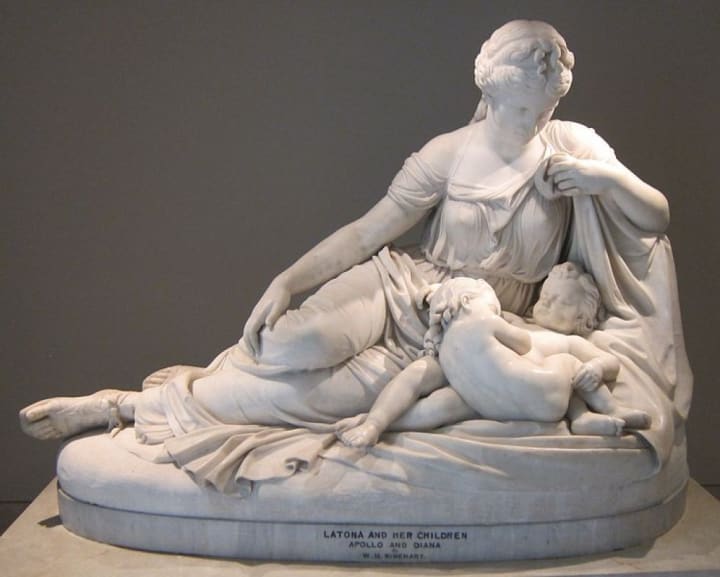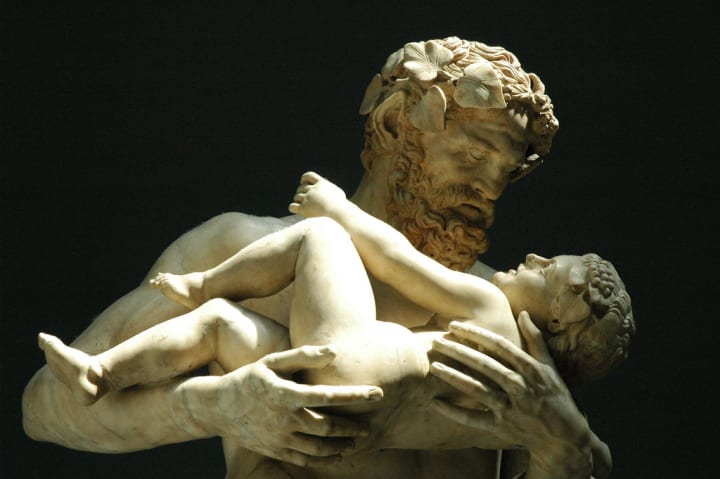Father of the Gods: Zeus
As a middle school teacher, I know that students enjoy the story more than just reading about the events from a text. What better story to start with than the one the Greeks have been telling since ancient times?

Even before the defeat of the Titans, Zeus was busy creating his own army of children. His first wife was always known to be Metis, the daughter of Titans Oceanus and Tethys. It was Metis that gave Zeus the idea of giving Kronos a drink that would cause him to puke up his other children Hades, Poseidon, Hestia, Demeter, and Hera, so they could help him defeat their father. Metis, the Titan of wisdom, was important to Zeus. Some would say she was the brains behind his whole operation, but Zeus's grandmother, Gaia, always the troublemaker, warned that her children would be smarter than their own father and overthrow him one day. Zeus could not allow this to happen and borrowed a play from his father's playbook. He swallowed Metis to keep her safely in his own belly where she could never have any children, including the daughter she was already carrying.
Once Metis was no longer in the picture, Zeus moved on to Themis, the Titan of order and daughter of Gaia and Uranus. With Zeus, Themis was said to have given birth to two sets of daughters. The first set would follow their mother's path as order bringer. The Horai were Dike (justice), Eirene (peace), and Eunomia (order of law). The second set of daughters, the Moirai, inherited their mother's ability to see the future. Clotho, Lachesis and, Atropos became better known as the Fates.
Zeus then sought out the sister of his first wife, Eurynome. She does not appear in much mythology except as the daughter of Oceanus and Tethys, the third wife of Zeus, and the mother of the Charities. The Charities, known as the Graces in Roman times, have varied in number and parentage. The first three, however, were generally considered to be daughters of Zeus and Eurynome. They were Aglaea (splendor), Euphrosyne (mirth), and Thalia (good cheer).
With the daughters of Kronos and Rhea still inside their father's belly, one must remember that, at the time, there would be no females around except for the other daughters and granddaughters of Gaia and Uranus. This should make it no surprise that Zeus would now seek out the attention of the remaining single daughter of Gaia, Mnemosyne. This pairing would produce nine daughters. It is interesting to note that to this point, daughters are all the young god has created. These nine girls were known collectively as the Muses. They would come to represent the aspects of creativity they were each associated with: Calliope (poetry), Clio (history), Erato (love poetry), Euterpe (music), Melpomene (tragedy), Polyhymnia (hymns), Terpsichore (dance), Thalia (comedy), and Urania (astronomy).
In the scheme of Greek mythology, it seems that it must have been around this point that Zeus used the potion, suggested by his first wife Metis, to retrieve his siblings from the belly of Kronos as the god's next love was his sister Demeter. For the ancient Greeks, the concept of mating with a sibling was not considered the illegal act it is today. Zeus would later go on to marry his sister Hera and have several children, but with Demeter, there was only Persephone. Little was noted of Persephone until she was abducted by Hades and became Queen of the Underworld. She was the goddess of springtime, owing to her mother being the goddess of the harvest.
Hera was the one goddess who seemed to be equal to her husband in power and remained his wife throughout the time of the gods. The two of them had children including Ares and his sister Enyo, the twin gods of war. Zeus and Hera were also the parents of Eileithyia, the goddess of childbirth, whom Hera used to exact her revenge on future lovers of her husband. They were also the parents of Hebe, the goddess of youth.
Birth of Athena

Birth of Athena
It was after Zeus married Hera and started having children that Zeus developed a major headache. The pain was so bad that he agreed to have another god, debate rages over who got the honors, hit him in the head with an ax. Once Zeus's head was split open, it was said that Athena jumped out fully grown, clad in armor and shouting at battle cry. The goddess of warfare and wisdom, daughter of Metis, was now counted among the many daughters of Zeus. By my count, Zeus now had 23 daughters and one son.
Hera, upset that her husband was capable of having a child, Athena, without her help is said to have done the same. She claimed that by eating a lotus flower, she conceived her son Hephaestus, the god of fire and forges. Perhaps it was true, as Hephaestus was said to have been born ugly and crippled. All of the other children of Zeus were said to have great beauty, even Ares, though his brutal attitude made it difficult to see. The poets were left to debate the parentage of Hephaestus, along with the argument of who threw the ugly infant god from Mount Olympus: Zeus or Hera.
Leto and Her Twins Apollo and Artemis

Leto and Her Twins Apollo and Artemis
Now Zeus was married to Hera, but do not for one moment believe that Zeus was done having children with other women of the Titan and goddess variety. A daughter of Coeus and Phoebe, first generation Titans, caught the eye of Zeus. Asteria, who was already the mother of Hecate, was not interested in being with Zeus or facing Hera's rage for doing so. She turned herself into a quail trying to escape the god's advances. Zeus's eagle, in pursuit, drove her into the Aegean Sea where she transformed into a floating island, Delos. Not to be denied, Zeus turned his attention to Asteria's sister Leto. She was not able to escape the advances of Zeus and became pregnant with twins. When Hera learned of her husband's actions, she forbade Leto from delivering the babies anywhere on Earth. In labor, Leto traveled from place to place, looking for a land where the people would allow her to deliver her children. Unfortunately, the people were more afraid of Hera and she was denied. Eventually, Leto came to the floating island of Delos, which had once been her sister. The people there welcomed her, and Artemis and Apollo were born.
Zeus, never one to let his wife's rage stop him from doing what he wanted, next found a daughter of Atlas who had tried to hide herself from the god's wandering eye. Zeus spotted her hiding in a cave on Mount Cyllene. Once pregnant with the child of Zeus, Maia continued to hide hoping that Hera would not find out about the baby. While she succeeded in having the child without facing retribution from the Queen of the Gods, the baby boy, Hermes, started making waves on his very first day of life. By stealing his big brother Apollo's sacred cattle and being forced to stand before his father accused of the crime, Hera certainly learned of her husband's betrayal.
Zeus was attributed with being the father of other gods and goddess as well, but they are all given alternate parentage that makes far more sense. Zeus also fathered many children with mortal women including Perseus, Heracles, Minos, Helen of Troy, and Pollux, the twin brother of Castor. Since the focus of this article is on immortal children born to Zeus, I will refrain from discussing them here, though I will admit that upon his death, Heracles was given immortality by his father. That leaves one last child of Zeus that I will discuss. Some say he was born of a mortal mother. Others say he was born from Persephone, but the mythology that has the most support, has him being born from his Zeus's leg.
Silenus and Dionysus

Silenus and Dionysus
Semele was the mortal daughter of the King of Thebes. She caught Zeus's eye and willingly mated with him. Unfortunately for her, Hera once again found out that her husband had been unfaithful. She tricked Semele into getting Zeus to show her his true immortal form, which was said to be more than any mortal could survive. Because Zeus had promised Semele anything she wished for, he had no choice but to grant her wish to see him, and of course, Semele did not survive. Zeus is said to have taken the unborn infant from his lover's womb and sowed him into his own thigh. When Dionysus was big enough to be born, Zeus removed his son from his leg and sent him to Semele's sister Ino to be raised. Hermes was the one who took the baby to Ino and suggested that she raise him as a girl in order to keep Hera from finding him. It did not work, and Ino was punished by Hera, but that is a whole other story. Dionysus did, however, manage to live to adulthood, despite many attempts by his stepmother Hera to destroy him. He spent much of his childhood being cared for by Silenus, an older satyr. He then wandered the world trying to stay out of Hera's sight, but he gained so many followers during his travels that he was made an Olympian upon his return to Greece and thereby an immortal.
With all of these immortal children, it is easy to see how Zeus earned the title "Father of the Gods."
About the Author
Daisy R. is a research writer and blogger from New York. He is a graduate of the New York University. Currently, he writes for an essay help company. He is interested in topics about parenting, education, business, motivation, health, writing, etc.
About the Creator
Daisy Rowley
I am a highly motivated individual with a strong work ethic, and a successful career in the education industry. I have a proven ability to multitask and prioritize effectively.






Comments
There are no comments for this story
Be the first to respond and start the conversation.